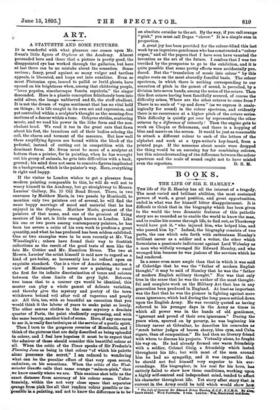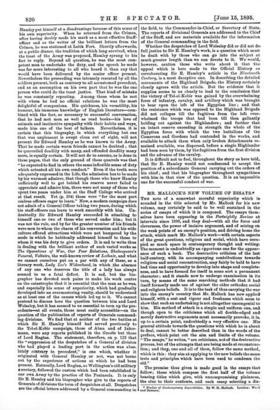BOOKS.
THE LIFE OF SIR E. HAMLEY.*
THE life of Sir E. Hamley has all the interest of a tragedy. The most varied and brilliant abilities, the most sustained powers of work, a great position, and great opportunities, ended in what was for himself bitter disappointment. It is difficult to think that in the biography which has been given to the world the true dramatic features of this pathetic story are so recorded as to enable the world to know the man, and to realise his course through life, to find out, as Thackeray would have put it, " who injured him, who helped him, and who passed him by." Indeed, the biography consists of two parts, the one which sets forth with enthusiasm Hamley's brilliant career as a soldier and a writer, the other which formulates a passionate indictment against Lord Wolseley as a man who wilfully wronged Sir Edward Hamley, and who wronged him because he was jealous of the services which he had rendered.
In a sense even more ample than that in which it was said of Coleridge that he was the "father of modern English thought," it may be said of Hamley that he was the " father of modern English military thought." Nor was that only true in the sense that he was the author of the most thought- ful and complete work on the Military Art that has in any generation been produced in England. At least as important was the fact that he was the pioneer in fighting against mere crass ignorance, which had during the long peace settled down upon the English Army. He was recently quoted as having referred to his younger days in the Army as times in which all power was in the hands of old gentlemen, "ignorant and proud of their own ignorance." Daring the years when, sparred on by poverty, he was beginning his literary career at Gibraltar, he describes his comrades as
much better judges of brown sherry, blue eyes, and Cuba cigars, than of composition." He had then no literary friend with whom to discuss his projects. Virtually alone, he fought his way on. He had already formed one warm friendship with a soldier, Colonel Gleig, a friendship which lasted throughout his life; but with most of the men around him he had no sympathy, and it was impossible that he should not feel himself very superior to his sur- roundings. His biographer, in his zeal for his hero, has entirely failed to show how these conditions, working upon a highly self-centred and independent mind, tended to affect his character throughout life. Yet story after story that is current in, the Army could be told which would show how • Th. W. of Gerisral Bir Edward Brun Haiutey. IC.C.M.O. By AU% Lines hhand. With Portraits. 2 vols. London : Wm. Blackwood and boss. Hamley put himself at a disadvantage because of this sense of his own superiority. When he returned from the Crimea, after having doubly made his mark as a most effective Staff- officer and as the writer of the brilliant letters from the Crimea, he was stationed at Leith Fort. Shortly afterwards, at a public dinner, the tradition of which long survived, when the toast of the Army was proposed, Hamley sprang to his feet to reply. Beyond all question, he was the most com- petent man to undertake the duty, and the speech he made was far more interesting to all who beard it than any that would have been delivered by the senior officer present. Nevertheless the proceeding was intensely resented by all the soldiers present, both as contrary to all accustomed precedent, and as an assumption on his own part that he was the one person who could do the toast justice. That kind of mistake he was constantly repeating. Among those whom he met with whom he had no official relations he was the most delightful of companions. His quickness, his versatility, his humour, his immense knowledge of English literature—com- bined with the fact, so necessary to successful conversation, that he had met men as well as read books—his love of animals and instinctive sympathy with their habits and ways, made him one of the best of talkers. Nevertheless, it is certain that this biography, in which everything but one that was unpleasant is swept clean out of sight, will not present Sir Edward Hamley as he was known to the Army. That he made certain warm friends cannot be doubted ; that he quarrelled deadlily with many, and offended deadlily many more, is equally certain. It will not do to assume, as is done in these pages, that the only ground of these quarrels was that "he expected to find in others the same inflexible sense of duty which actuated all his own conduct." Even if the truth were adequately expressed in the Life, the admission has to be made by his warmest admirer, that though those who knew Hamley sufficiently well to get behind his reserve never failed to appreciate and admire him, there were not many of those who spent two years under him at the Staff College who arrived at that result. Yet (p. 204) these were "for the most part zealous officers eager to learn." Now, a modern campaign does not admit of a General Officer taking two years, during which his staff-officers can learn to work smoothly with him. Un- doubtedly Sir Edward Hamley succeeded in attaching to himself one or two of those who served under him; but it was not the rule, and by far the greater number of his friends were men to whom the charm of his conversation and his wide culture offered attractions which were not hampered by the mode in which he habitually addressed himself to those to whom it was his duty to give orders. It is sad to write thus in dealing with the brilliant author of such varied works as The Operations of War, Our Poor Relations, Shakespeare's Funeral, Voltaire, the well-known review of Lothair, and what we cannot ourselves put on a par with any of these, as a literary work, Lady Lee's Widowhood, in which the absence of any one who deserves the title of a lady has always seemed to us a fatal defect. It is sad, but the bio- grapher has devoted such pains to make his work centre on the catastrophe that it is essential that the man as he was, and especially his sense of superiority, which had gradually developed into an overmastering vanity, should be understood as at least one of the causes which led up to it. We cannot pretend to discuss here the question between him and Lord Wolseley, but it has seemed to us essential to tarn up the pre- cedents—at all events, those most easily accessible—on the question of the publication of reports of Generals command- ing divisions. We find that at neither of the two battles at which Sir E. Hamley himself had served previously to the Tel-el-Kebir campaign, those of Alma and of Inker- mann, were any reports published in the Gazette but those of Lord Raglan. The statement, therefore, on p. 123 that the "suppression of the despatches of a General of division who had played a leading part in the action was abso- lutely contrary to precedent," is one which, whether it originated with General Hamley or not, was not borne out by the experience of actions at which he had been present. Naturally, Lord Raglan, as Wellington's old military 03cretary, followed the custom which had been established in our own Army by the practice of the Peninsula. It is only Sir E. Hamley and his biographer who give to the reports of Generals of divisions the term of despatches at all. Despatches are the official letters addressed by a General commanding in the field, to the Commander-in-Chief, or Secretary of State.. The reports of divisional Generals are addressed to the Chief of the Staff, and are materials available for the information of the General commanding in the field.
Whether the despatches of Lord Wolseley did or did not do. full justice to Sir E. Hamley's work, is a question which must be dealt with by those who can go into the subject at much greater length than we can devote to it. We would, however, caution those who write about it that the appeal which is here made to the Official History as corroborating Sir E. Hamley's article in the Nineteenth. Century, is a most deceptive one. In describing the detailed. movements of the Highland Brigade, the History certainly. closely agrees with the article. But the evidence that it supplies seems to us clearly to lead to the conclusion that the victory of Tel-el-Kebir was gained by the overwhelming, force of infantry, cavalry, and artillery which was brought to bear upon the left of the Egyptian line ; and that the resistance which was opposed to the Highland Brigade did not collapse till the fugitives from the left over- whelmed the troops that had been till then gallantly holding out against the Highlanders ; and further that an intact reserve exceeding in strength the whole of the, Egyptian force with which the two battalions of the. Camerons and Gordons had contended in the works, and available to attack them when only broken detachments re-. mained available, was dispersed, before a single Highlander- had been seen by them, by the fugitives from the first division and the advance of the cavalry.
It is difficult not to feel, throughout the story as here told,, that Sir E. Hamley would not condescend to accept the position of a subordinate General carrying out the orders of his chief ; and that his biographer throughout sympathises with him in that view of the question. It is an impossible. one for the successful conduct of war.



































 Previous page
Previous page